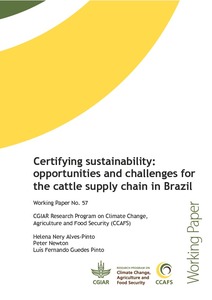Resource information
Up to 75% of deforestation in Brazil is associated with cattle ranching. To reduce forest conversion and increase sustainability in the cattle supply chain, government, private sector and civil society support interventions based on combinations of institutions and policies, incentives, and information and technology. In this paper we analyse the observed and expected interactions among the Sustainable Agriculture Network (SAN) Standard for Sustainable Cattle Production Systems certification program and other interventions associated with livestock and deforestation in Amazonia. Semi-structured interviews were conducted with cattle supply chain key actors, who identified the opportunities and barriers to the development and scaling of the SAN cattle program. The SAN cattle program has set a new high standard for sustainability, demonstrated the viability of certifying the cattle supply chain, and created new incentives and markets. However, the program has certified few farms to date. Other interventions are playing a critical role in incentivizing farms towards enhanced sustainability. Interventions that complement progress towards the SAN program include those that help producers to comply with forest laws or provide farmers with access to information and technology to improve their practices. Other interventions may constrain the program, for example by competing with the standards in the marketplace. Greater coordination among interventions may catalyze a more coherent, strategic approach to enhanced sustainability.


